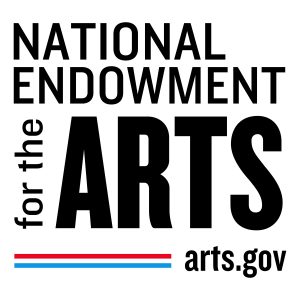As we approach the end of 2021, we asked our fellow staff members to share some of the books that impacted them the most this past year. Check out a handful of our picks below.
Click the link below each book to order it directly from Octavia Books.
We appreciate any questions or feedback about NOMA’s suggested reading lists. Please feel welcome to contact us at education@noma.org.
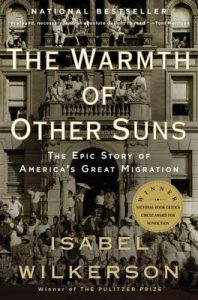
“The Warmth of Other Suns: The Epic Story of America’s Great Migration” by Isabel Wilkerson
The Warmth of Other Suns: The Epic Story of America’s Great Migration
Isabel Wilkerson
Random House, 2010, ISBN: 978-0679444329
From 1915 to 1970, this exodus of almost six million people changed the face of America. Wilkerson compares this epic migration to the migrations of other peoples in history. She interviewed more than a thousand people, and gained access to new data and official records, to write this definitive and vividly dramatic account of how these American journeys unfolded, altering our cities, our country, and ourselves.
With stunning historical detail, Wilkerson tells this story through the lives of three unique individuals: Ida Mae Gladney, who in 1937 left sharecropping and prejudice in Mississippi for Chicago, where she achieved quiet blue-collar success and, in old age, voted for Barack Obama when he ran for an Illinois Senate seat; sharp and quick-tempered George Starling, who in 1945 fled Florida for Harlem, where he endangered his job fighting for civil rights, saw his family fall, and finally found peace in God; and Robert Foster, who left Louisiana in 1953 to pursue a medical career, the personal physician to Ray Charles as part of a glitteringly successful medical career, which allowed him to purchase a grand home where he often threw exuberant parties.
Wilkerson brilliantly captures their first treacherous and exhausting cross-country trips by car and train and their new lives in colonies that grew into ghettos, as well as how they changed these cities with southern food, faith, and culture and improved them with discipline, drive, and hard work. Both a riveting microcosm and a major assessment, The Warmth of Other Suns is a bold, remarkable, and riveting work, a superb account of an “unrecognized immigration” within our own land. Through the breadth of its narrative, the beauty of the writing, the depth of its research, and the fullness of the people and lives portrayed herein, this book is destined to become a classic.
“It’s the October 2022 selection for NOMA Book Club!” – Tracy Kennan, Curator of Education
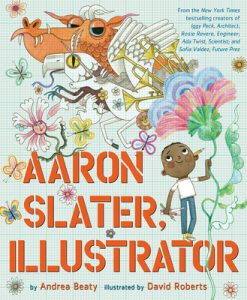
“Aaron Slater, Illustrator (The Questioneers)” by Andrea Beaty, David Roberts (Illustrator)
Aaron Slater, Illustrator (The Questioneers)
By Andrea Beaty, David Roberts (Illustrator)
Harry N. Abrams, 2021, ISBN: 9781419753961
Aaron Slater loves listening to stories and dreams of one day writing them himself. But when it comes to reading, the letters just look like squiggles to him, and it soon becomes clear he struggles more than his peers. When his teacher asks each child in the class to write a story, Aaron can’t get a single word down. He is sure his dream of being a storyteller is out of reach . . . until inspiration strikes, and Aaron finds a way to spin a tale in a way that is uniquely his.
Printed with a dyslexia-friendly font, Aaron Slater, Illustrator tells the empowering story of a boy with dyslexia who discovers that his learning disability may inform who he is, but it does not define who he is, and that there are many ways to be a gifted communicator.
“I love to share with my children the wonderful books from Andrea Beaty’s series, where creative children find powerful roles in science, architecture, and politics. The newest book, Aaron Slater, Illustrator, is the story of a boy with dyslexia who discovers art as a unique communication tool. The book is carefully designed in a dyslexia-friendly font. (This series inspires the new Netflix series Ada Twist, Scientist”.)” – Mel Buchanan, RosaMary Curator for Decorative Arts and Design

“Mexican Gothic” by Silvia Moreno-Garcia
Mexican Gothic
Silvia Moreno-Garcia
Del Rey, 2021, ISBN: 9780525620808
After receiving a frantic letter from her newly-wed cousin begging for someone to save her from a mysterious doom, Noemí Taboada heads to High Place, a distant house in the Mexican countryside. She’s not sure what she will find—her cousin’s husband, a handsome Englishman, is a stranger, and Noemí knows little about the region.
Noemí is also an unlikely rescuer: She’s a glamorous debutante, and her chic gowns and perfect red lipstick are more suited for cocktail parties than amateur sleuthing. But she’s also tough and smart, with an indomitable will, and she is not afraid: Not of her cousin’s new husband, who is both menacing and alluring; not of his father, the ancient patriarch who seems to be fascinated by Noemí; and not even of the house itself, which begins to invade Noemi’s dreams with visions of blood and doom.
Her only ally in this inhospitable abode is the family’s youngest son. Shy and gentle, he seems to want to help Noemí, but might also be hiding dark knowledge of his family’s past. For there are many secrets behind the walls of High Place. The family’s once colossal wealth and faded mining empire kept them from prying eyes, but as Noemí digs deeper she unearths stories of violence and madness.
And Noemí, mesmerized by the terrifying yet seductive world of High Place, may soon find it impossible to ever leave this enigmatic house behind.
“I love a spooky read, and this book was written so beautifully, I could almost place myself there.” – Margaux Krane, Director of Brand and Communications
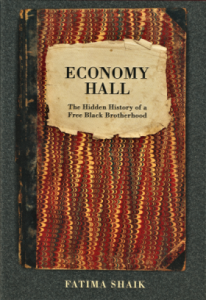
“ECONOMY HALL: The Hidden History of a Free Black Brotherhood” by Fatima Shaik
ECONOMY HALL: The Hidden History of a Free Black Brotherhood
Fatima Shaik
Historic New Orleans Collections, 2021, ISBN: 9780917860805
It is impossible to imagine New Orleans, and by extension American history, without the vibrant and singular Creole culture. In the face of an oppressive white society, members of the Société d’Economie et d’Assistance Mutuelle built a community and held it together through the era of slavery, the Civil War, Reconstruction, and Jim Crow terrorism. Economy Hall: The Hidden History of a Free Black Brotherhood follows Ludger Boguille, his family, and friends through landmark events—from the Haitian Revolution to the birth of jazz—that shaped New Orleans and the United States.
The story begins with the author’s father rescuing a century’s worth of handwritten journals, in French, from a trash hauler’s pickup truck. From the journals’ pages emerged one of the most important multi-ethnic, intellectual communities in the US South: educators, world-traveling merchants, soldiers, tradesmen, and poets. Although Louisiana law classified them as men of color, Negroes, and Blacks, the Economie brothers rejected racism and colorism to fight for suffrage and education rights for all.
A descendant of the Economie’s community, author Fatima Shaik has constructed a meticulously detailed nonfiction narrative that reads like an epic novel.
Selected by Chantell Nabonne, Assistant Curator of Education
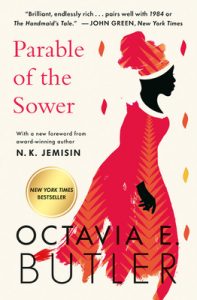
“Parable of the Sower” by Octavia E. Butler
Parable of the Sower
Octavia E. Butler
Grand Central Publishing, 2019, ISBN: 9781538732182
When global climate change and economic crises lead to social chaos in the early 2020s, California becomes full of dangers, from pervasive water shortage to masses of vagabonds who will do anything to live to see another day. Fifteen-year-old Lauren Olamina lives inside a gated community with her preacher father, family, and neighbors, sheltered from the surrounding anarchy. In a society where any vulnerability is a risk, she suffers from hyperempathy, a debilitating sensitivity to others’ emotions.
Precocious and clear-eyed, Lauren must make her voice heard in order to protect her loved ones from the imminent disasters her small community stubbornly ignores. But what begins as a fight for survival soon leads to something much more: the birth of a new faith . . . and a startling vision of human destiny.
Selected by Brian Piper, Mellon Foundation Assistant Curator for Photography
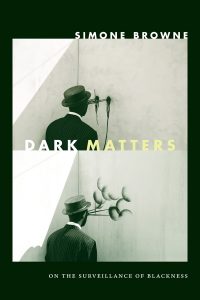
“Dark Matters: On the Surveillance of Blackness” by Simone Browne
Dark Matters: On the Surveillance of Blackness
Simone Browne
Duke University Press, 2015
In Dark Matters Simone Browne locates the conditions of blackness as a key site through which surveillance is practiced, narrated, and resisted. She shows how contemporary surveillance technologies and practices are informed by the long history of racial formation and by the methods of policing black life under slavery, such as branding, runaway slave notices, and lantern laws. Placing surveillance studies into conversation with the archive of transatlantic slavery and its afterlife, Browne draws from black feminist theory, sociology, and cultural studies to analyze texts as diverse as the methods of surveilling blackness she discusses: from the design of the eighteenth-century slave ship Brooks, Jeremy Bentham’s Panopticon, and The Book of Negroes, to contemporary art, literature, biometrics, and post-9/11 airport security practices. Surveillance, Browne asserts, is both a discursive and material practice that reifies boundaries, borders, and bodies around racial lines, so much so that the surveillance of blackness has long been, and continues to be, a social and political norm.
Selected by Colton Clifford, Visitor Experience Team Lead

“To Make Their Own Way in the World: The Enduring Legacy of the Zealy Daguerreotypes” by Ilisa Barbash (Editor), Molly Rogers (Editor), Deborah Willis (Editor)
To Make Their Own Way in the World: The Enduring Legacy of the Zealy Daguerreotypes
By Ilisa Barbash (Editor), Molly Rogers (Editor), Deborah Willis (Editor)
Aperture, 2020, ISBN: 9781597114783
Photographed by Joseph T. Zealy for Harvard professor Louis Agassiz in 1850, they were rediscovered at Harvard’s Peabody Museum in 1976. This groundbreaking multidisciplinary volume features essays by prominent scholars who explore such topics as the identities of the people depicted in the daguerreotypes, the close relationship between photography and race, and visual narratives of slavery and its lasting effects. With over two hundred illustrations, including new photography by Carrie Mae Weems, this book frames the Zealy daguerreotypes as works of urgent engagement.
Selected by Brian Piper, Mellon Foundation Assistant Curator for Photography
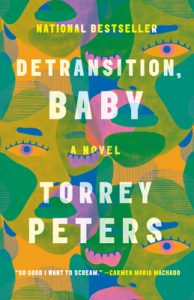
“Detransition, Baby: A Novel” by Torrey Peters
Detransition, Baby: A Novel
Torrey Peters
One World, 2021, ISBN: 9780593133385
Reese almost had it all: a loving relationship with Amy, an apartment in New York City, a job she didn’t hate. She had scraped together what previous generations of trans women could only dream of: a life of mundane, bourgeois comforts. The only thing missing was a child. But then her girlfriend, Amy, detransitioned and became Ames, and everything fell apart. Now Reese is caught in a self-destructive pattern: avoiding her loneliness by sleeping with married men.
Ames isn’t happy either. He thought detransitioning to live as a man would make life easier, but that decision cost him his relationship with Reese—and losing her meant losing his only family. Even though their romance is over, he longs to find a way back to her. When Ames’s boss and lover, Katrina, reveals that she’s pregnant with his baby—and that she’s not sure whether she wants to keep it—Ames wonders if this is the chance he’s been waiting for. Could the three of them form some kind of unconventional family—and raise the baby together?
This provocative debut is about what happens at the emotional, messy, vulnerable corners of womanhood that platitudes and good intentions can’t reach. Torrey Peters brilliantly and fearlessly navigates the most dangerous taboos around gender, sex, and relationships, gifting us a thrillingly original, witty, and deeply moving novel.
Selected by Charlie Tatum, Digital Marketing Manager
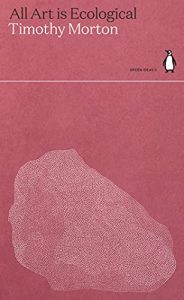
“All Art Is Ecological” by Timothy Morton
All Art Is Ecological
Timothy Morton
Penguin Classic, 2021
Over the past 75 years, a new canon has emerged. As life on Earth has become irrevocably altered by humans, visionary thinkers around the world have raised their voices to defend the planet, and affirm our place at the heart of its restoration. Their words have endured through the decades, becoming the classics of a movement. Together, these books show the richness of environmental thought, and point the way to a fairer, saner, greener world.
“This book pairs nicely with NOMA’s current exhibition, Dawn DeDeaux: The Space Between Worlds.” – Spencer Shaw, Visitor Experience Floor Lead
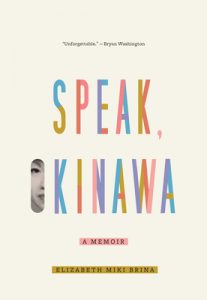
“Speak, Okinawa: A Memoir” by Elizabeth Miki Brina
Speak, Okinawa: A Memoir
Elizabeth Miki Brina
Knopf, 2021, ISBN: 9780525657347
Elizabeth’s mother was working as a nightclub hostess on U.S.-occupied Okinawa when she met the American soldier who would become her husband. The language barrier and power imbalance that defined their early relationship followed them to the predominantly white, upstate New York suburb where they moved to raise their only daughter. There, Elizabeth grew up with the trappings of a typical American childhood and adolescence. Yet even though she felt almost no connection to her mother’s distant home, she also felt out of place among her peers.
Decades later, Elizabeth comes to recognize the shame and self-loathing that haunt both her and her mother, and attempts a form of reconciliation, not only to come to terms with the embattled dynamics of her family but also to reckon with the injustices that reverberate throughout the history of Okinawa and its people. Clear-eyed and profoundly humane, Speak, Okinawa is a startling accomplishment—a heartfelt exploration of identity, inheritance, forgiveness, and what it means to be an American.
Selected by Charlie Tatum, Digital Marketing Manager
Education and outreach initiatives at NOMA are supported in part by the Zemurray Foundation; the Lois and Lloyd Hawkins Jr. Foundation; The Helis Foundation; The Gayle and Tom Benson Foundation; The City of New Orleans; IBERIABANK; The Wagner Foundation; Janice Parmelee and Bill Hammack; the Diversifying Art Museum Leadership Initiative, funded by the Walton Family Foundation and the Ford Foundation; Sara and David Kelso; Patrick F. Taylor Foundation; Dr. Scott S. Cowen; The RosaMary Foundation; The Azby Fund; the Louisiana Division of the Arts, Office of Cultural Development, Department of Culture, Recreation & Tourism, in cooperation with the Louisiana State Arts Council and the National Endowment for the Arts, a Federal agency; The Collins C. Diboll Private Foundation; Burkenroad Foundation; Marian Dreux Van Horn Education Endowment; The Andrew W. Mellon Foundation; Ruby K. Worner Trust through the PNC Charitable Trusts Grant Review Committee; The Harry T. Howard III Foundation; New Orleans Jazz & Heritage Festival and Foundation, Inc.; Harvey and Marie Orth; The Bruce J. Heim Foundation; and Mrs. Bennett A. Molter, Jr. This project is supported in part by the National Endowment for the Arts.



